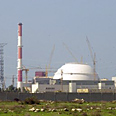
Experts: Israel lacks capability to hit Iran's nuke facilities
US weekly Newsweek quotes Western intelligence officials as saying Jewish state unable to destroy Tehran's nuclear facilities using just conventional weapons
WASHINGTON - Western intelligence experts believe that Iran's nuclear facilities are so deep underground that it would be difficult for Israel to wipe them out, or even significantly damage them with an air strike, according to an article which will be published by American weekly Newsweek next Monday.
The magazine's Periscope section quotes a "Western official" as saying that in order to seriously setback Iran's nuclear program, at least four of its key development sites would have to be hit, but they are located in tunnels fortified by barriers more than 60 feet thick.
According to the official and other US experts, Israel simply does not possess conventional weapons capable of decommissioning these facilities, since breaking through the thick shell would require, at minimum, several bunker-buster bombs striking precisely the same spot.
Former UN nuclear expert David Albright told the magazine that "these targets would be very hard to destroy."
The report also states that theoretically, Israel could do a lot more damage with a nuclear strike, but US and other Western experts say there is no reason to believe the Israel will be the first to use nuclear weapons.
The magazine then goes into details of the "Sinbad Affair": Two Western sources involved in the counter-proliferation efforts against Iran, US and allied efforts to keep tabs on Iranian nukes suffered a blow recently, due to a miscommunication between the various intelligence agencies.
Sources quoted in the report said that for more than 10 years, Germany's BND (the equivalent of the CIA) employed an Iranian-Canadian informant known by the code name "Sinbad." Sinbad peddled technology to the Iranians, and in turn brought the BND high-quality Iranian government documents, including what was described by the leading German publication Der Spiegel, as "pictures of tunnel-digging machinery and briefing papers on nuclear delivery systems."
But the espionage operation recently ran aground when German Customs officers, unaware of Sinbad's role as a spy, busted him for illegal missile-technology shipments to Iran.
Sinbad had concealed extracurricular schemes from the BND, and the spy agency had no power to stop the investigation. One of the counter-proliferation officials said that Sinbad's arrest was "a significant blow to espionage efforts against Iran's nuclear program."










